Demolition Contractors Bainbridge
Top 10 Demo Companies in Bainbridge
Get 3 FREE Demolition Contractor quotes for your project today! Compare profiles, reviews, accreditations, portfolio, etc... and choose the best deal.

Ohio Valley Excavating
38 reviewsLebanon, OH, USWho We Are Founded in 2004, Ohio Valley Excavating (OVE) delivers full-service excavation solutions in the electrical and communications industries for private, public, and federal sectors. OVE's capabilities include providing the end-users with a turn-key solution for underground electrical and communication infrastructure. OVE is headquartered in Lebanon, OH and services the Midwest. Our History Founded: 2004 Joined Congruex: 2021
- Services
- Why Us?
- Gallery
Get Quote
Ady Excavating
3.73 reviewsYoungstown, USBuilt on Quality and Dedication Ady Excavating offers a wide variety of services to Industrial, Commercial, Residential, and Municipal customers. Our team is dedicated to providing high-quality workmanship and exceptional customer service. We are committed to safety and environmental responsibility on every project. We have a proven track record of success in the culvert industry, with thousands of feet of Paved invert repairs and slip lining under our belt. We are the perfect choice to take care of any failing culvert. We utilize the Mr. Manhole method to bring all of your adjustment needs to today's ODOT standards. Whether it's a large project or a small repair, we have you covered. With all of our company's past experience and success in the culvert industry, we now offer culvert inspections and consultations. Contact us today to get your inspection scheduled.
- Services
- Why Us?
- Gallery
Get Quote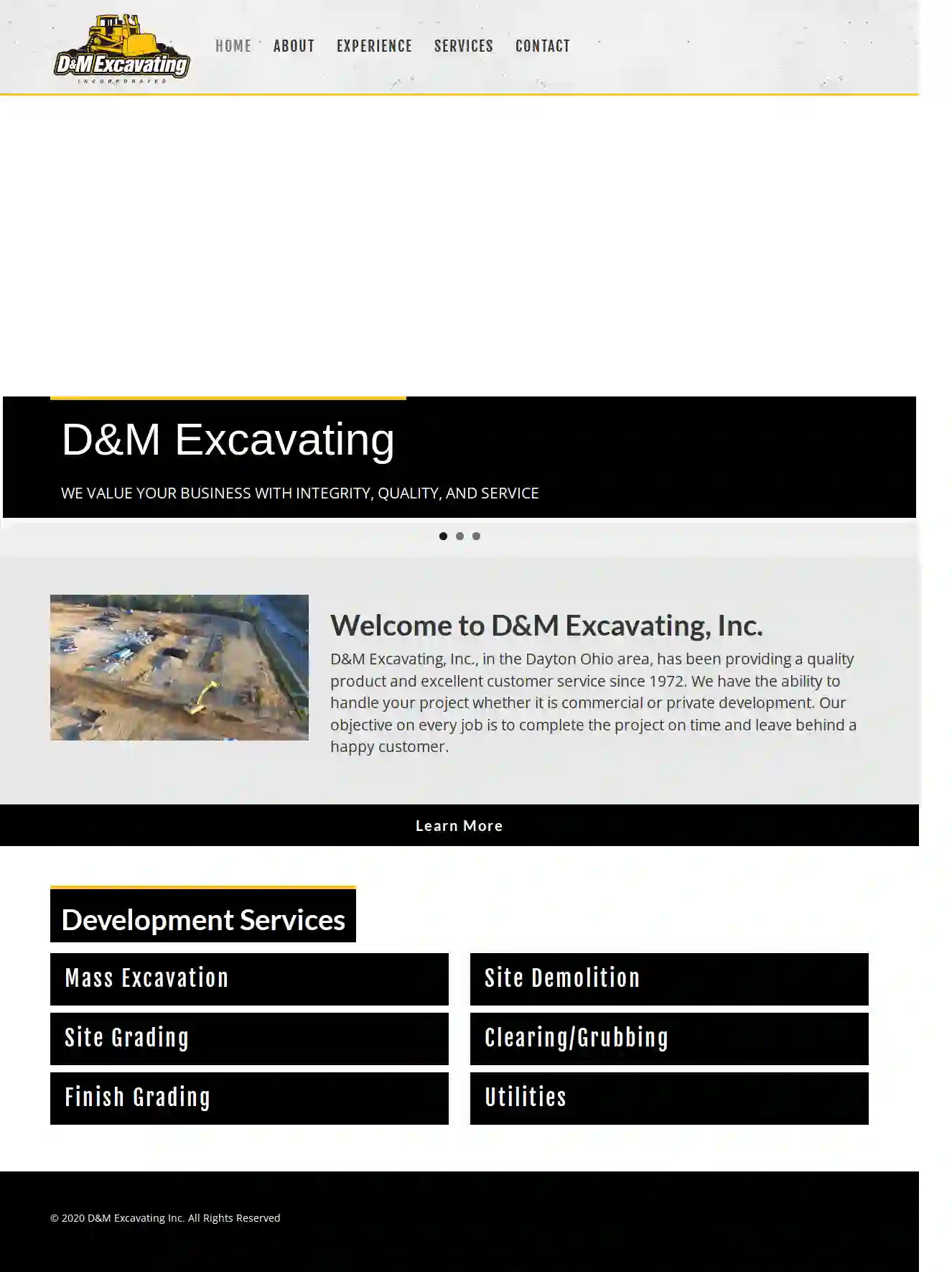
D & M Excavating Inc
4.47 reviews9465 State Route 202, Tipp City, 45371, USAbout D&M Excavating, Inc. D&M Excavating, Inc., serving the Dayton Ohio area, has been providing quality products and excellent customer service since 1972. We have the expertise to handle your project, whether it's commercial or private development. Our commitment on every job is to complete the project on time and leave behind a happy customer. D&M Excavating, Inc. has been in business for over 40 years. During this time, we have worked primarily in the Miami Valley on a large variety of projects for many customers while maintaining relationships with several repeat customers. We are large enough to handle most any project but remain small enough that our owners get to each job daily to check on progress and resolve any problems that may arise. We recognize that leaving the job with a satisfied client is the only way to remain in business. Our many repeat customers are proof of the good impression we leave after every job.
- Services
- Why Us?
- Gallery
Get Quote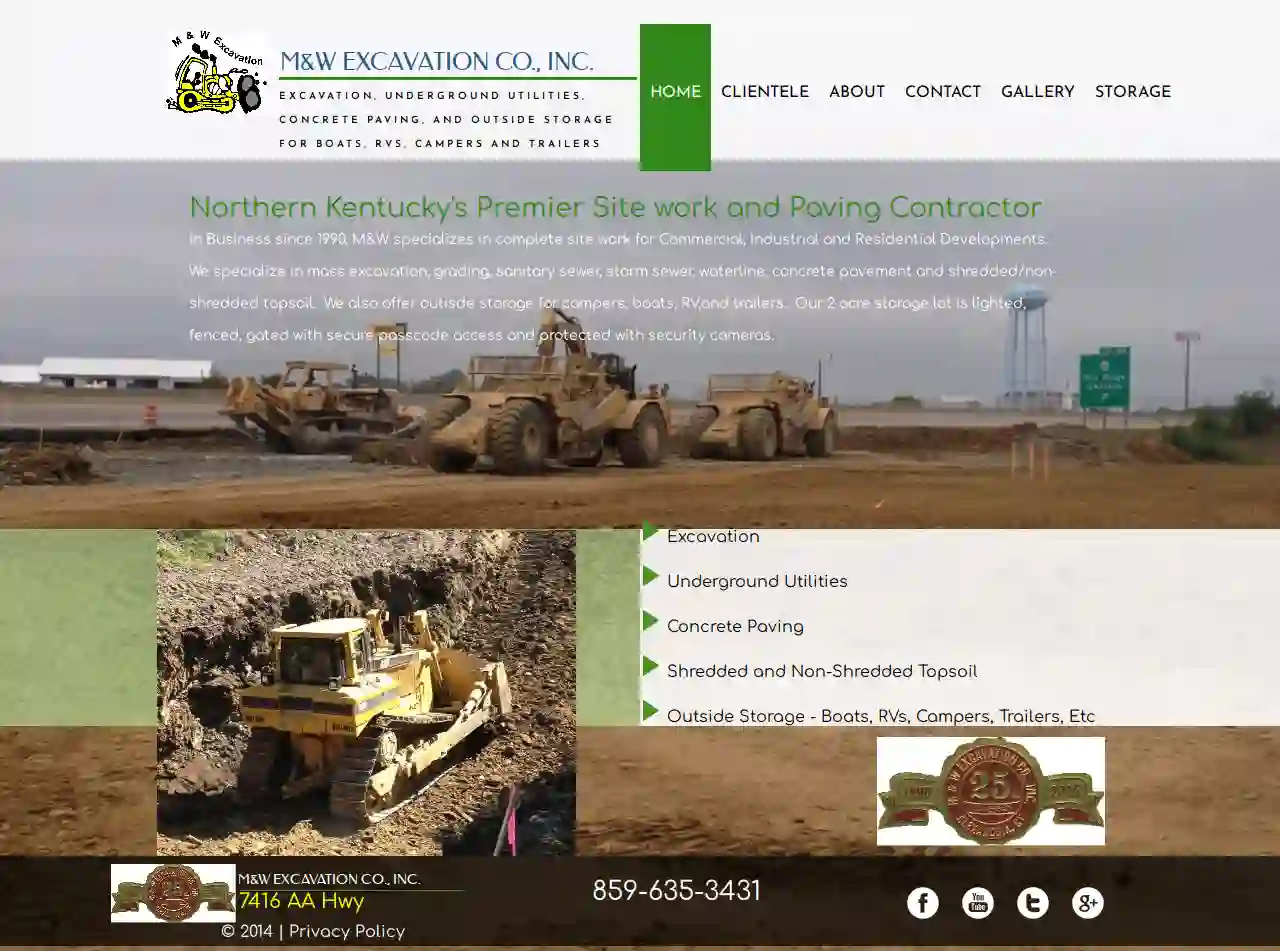
M & W Excavation Co Inc
3.25 reviews7416 AA Hwy, USNorthern Kentucky's Premier Site Work and Paving Contractor M&W Excavation Co., Inc. has been serving Northern Kentucky since 1990, specializing in complete site work for commercial, industrial, and residential developments. We are a full-service site contractor with a reputation for quality and experience, regularly called on by builders and homeowners. No project is too big or too small for our team. We specialize in a wide range of services, including: Mass Excavation Grading Sanitary Sewer Storm Sewer Waterline Concrete Pavement Shredded and Non-Shredded Topsoil We also offer secure outside storage for campers, boats, RVs, and trailers. Our 2-acre storage lot is lighted, fenced, gated with secure passcode access, and protected with security cameras.
- Services
- Why Us?
- Gallery
Get Quote
High Country Excavation, LLC - Landscape Excavator Service & Demolition Excavation Contractor
57 reviewsHigh Country Excavation, LLC, Lakewood, CO, 80235, USAbout High Country Excavation, LLC High Country Excavation, LLC is a trusted local excavator in Lakewood, CO, serving residential property owners with a wide range of services beyond just excavation. We've been serving the community for over a decade, building a reputation for quality work and customer satisfaction. Our Services We specialize in a variety of excavation projects, including septic system installation, landscape excavation, site preparation, tree removal, snow removal, drainage, demolition, rock wall construction, and more. We're equipped to handle a wide range of projects, from small-scale landscaping to large-scale construction. Our Work Process We believe in optimizing our work process to ensure efficiency and cost-effectiveness. We carefully plan each project, providing realistic timelines and cost estimates. We're committed to delivering high-quality results on time and within budget.
- Services
- Why Us?
- Accreditations
- Gallery
Get Quote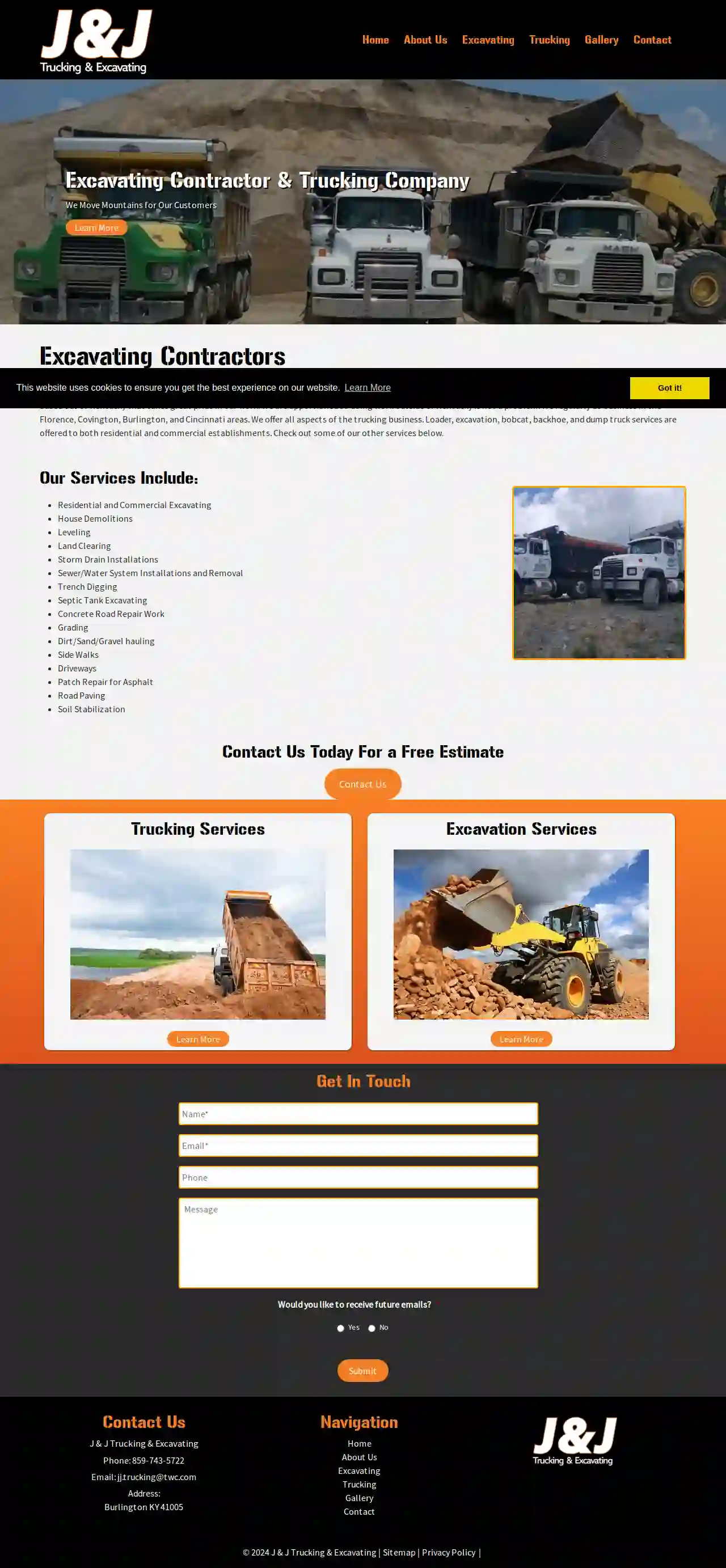
J&J Trucking & Excavation
3.73 reviewsBurlington, 41005, USWe Move Mountains for Our Customers J & J Trucking and Excavating has been offering commercial and residential trucking and excavation services for over 30 years. We are a small family-owned company based out of Kentucky that takes great pride in our work. We are apportioned so doing work outside of Kentucky is not a problem. We regularly do business in the Florence, Covington, Burlington, and Cincinnati areas. We offer all aspects of the trucking business. Loader, excavation, bobcat, backhoe, and dump truck services are offered to both residential and commercial establishments. With over 30 years in the trucking and excavating business you can trust on J & J trucking to get the job done right the first time. We are a small family-owned company based out of Kentucky that takes great pride in our work. We treat our customers the way we want to be treated and strive to make sure your project goes off without a hitch.
- Services
- Why Us?
- Gallery
Get Quote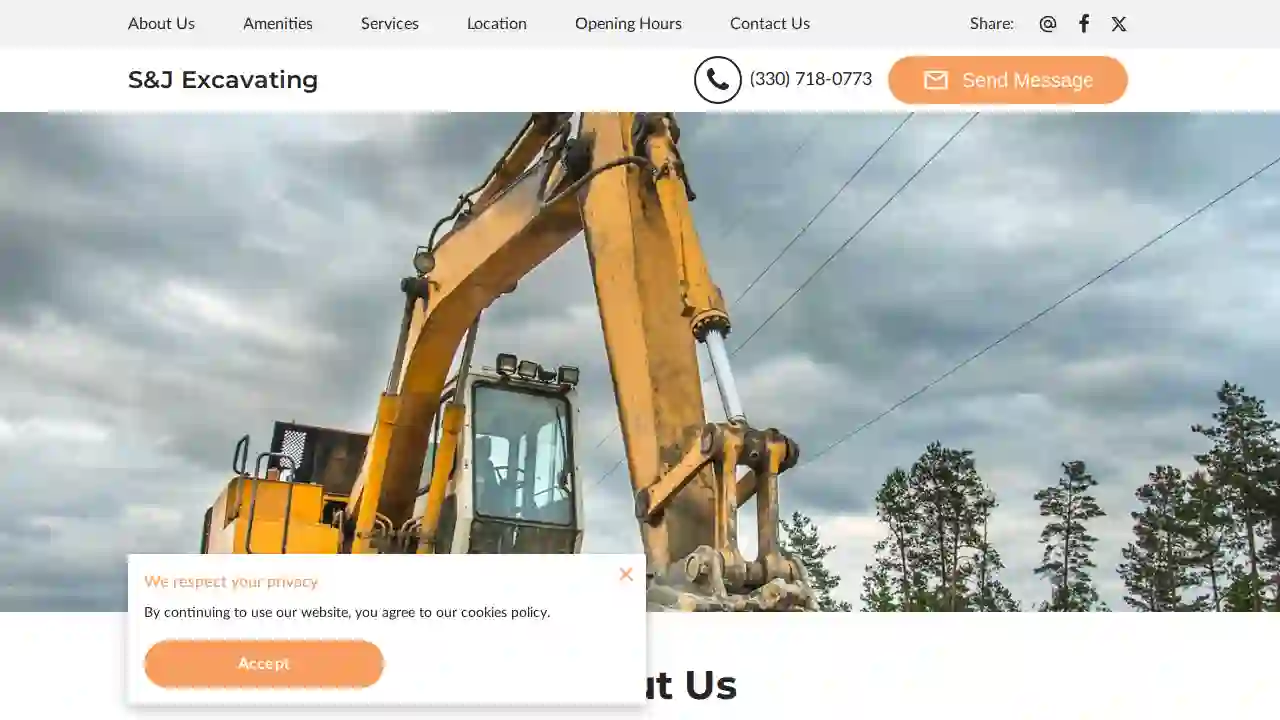
S&J Excavating
Youngstown, Ohio, 44510, USAbout Us Here at S&J Excavating we deliver a selection of professional excavation services based in the area. Our experienced excavators do more than just dig holes and transport dirt, our services include a plethora of skills from preparing your building site for foundation laying, digging trenches, as well as creating drainage routes across building developments. Of course, we still also dig holes and transport dirt. So if you’re interested in our excavation services give us a message on the form below to find out more, or call us at +12348557653 .
- Services
- Why Us?
Get Quote
3RD TERRAIN LTD
525 reviews5151 Monroe St, Suite 210A, 5151 Monroe St Suite 210A, Toledo, 43623, USWelcome to 3rd Terrain LTD 3rd Terrain, based out of Toledo, Ohio, is where Honesty, Commitment, and Quality Craftsmanship converge to redefine excellence in excavation services. Our unwavering dedication to integrity sets us apart, ensuring that every project is executed with transparency and trustworthiness. Any building project requires excavation. From pools to driveways and parking lots to basements, at 3rd Terrain Ltd. We are committed to providing the best service for all of our Toledo clients, with proven work methods. Residential or commercial, large or small, there’s no project we’ll turn down. And, with competitive rates as well as time-efficient practices, our clients know they can count on us to get jobs done up to the highest standards, within budget, by deadline. Being experts, means that we are committed to every project. With over 20 years of experience in our field, our Craftsmen are exceptional Heavy Equipment Operators. We get the job done right at affordable prices. Choosing 3rd Terrain LTD for excavation in Toledo, Ohio, is a decision rooted in a commitment to excellence, reliability, and unmatched service. Here’s why we stand out: Expertise and Experience With years of experience in the industry, 3rd Terrain LTD brings a wealth of expertise to every excavation project. Our seasoned professionals are well-versed in the unique terrain challenges of Toledo, ensuring that your project is handled with precision and efficiency. Local Understanding As a Toledo-based company, we have an in-depth understanding of the local landscape and regulations. This familiarity enables us to navigate the specific challenges of excavation in the area, ensuring compliance with local standards and optimizing project outcomes. Cutting-Edge Technology 3rd Terrain LTD employs state-of-the-art equipment and cutting-edge technology to execute excavation projects efficiently and effectively. Our commitment to innovation ensures that we deliver the highest quality results, exceeding client expectations. At 3rd Terrain Ltd., we believe in team work that starts with our team, and continues with our clients. When you work with us, we’re all heading towards the same goal and want to see the same level of great results. Having served the area for many years now, we have evolved to be constantly learning, and building relationships with our fellow contractors and distributors. Don’t worry about renting machinery to get excavation work done when you work with 3rd Terrain Ltd.. Always up to date on the latest in our industry, we show up to the job with everything we could possibly need, and then some! To complete a job correctly, you need a combination of experience, and the right tools—and our team has both!We’ve invested so you don’t have to. So, whether you’re looking to build a home, add an addition or water feature to your existing home, or add to the area’s vibrant commercial structures, we can accomplish anything you require. At 3rd Terrain Ltd., we’re passionate about the work we do, and it shows. Every new job that crosses our path is unique in its own way, and being able to complete it up to our own personal high standards as well as that of our clients is something we love being able to do. When you’re looking for a team that is committed to excellence, reliability, and unmatched service, look no further than 3rd Terrain LTD.
- Services
- Why Us?
- Gallery
Get Quote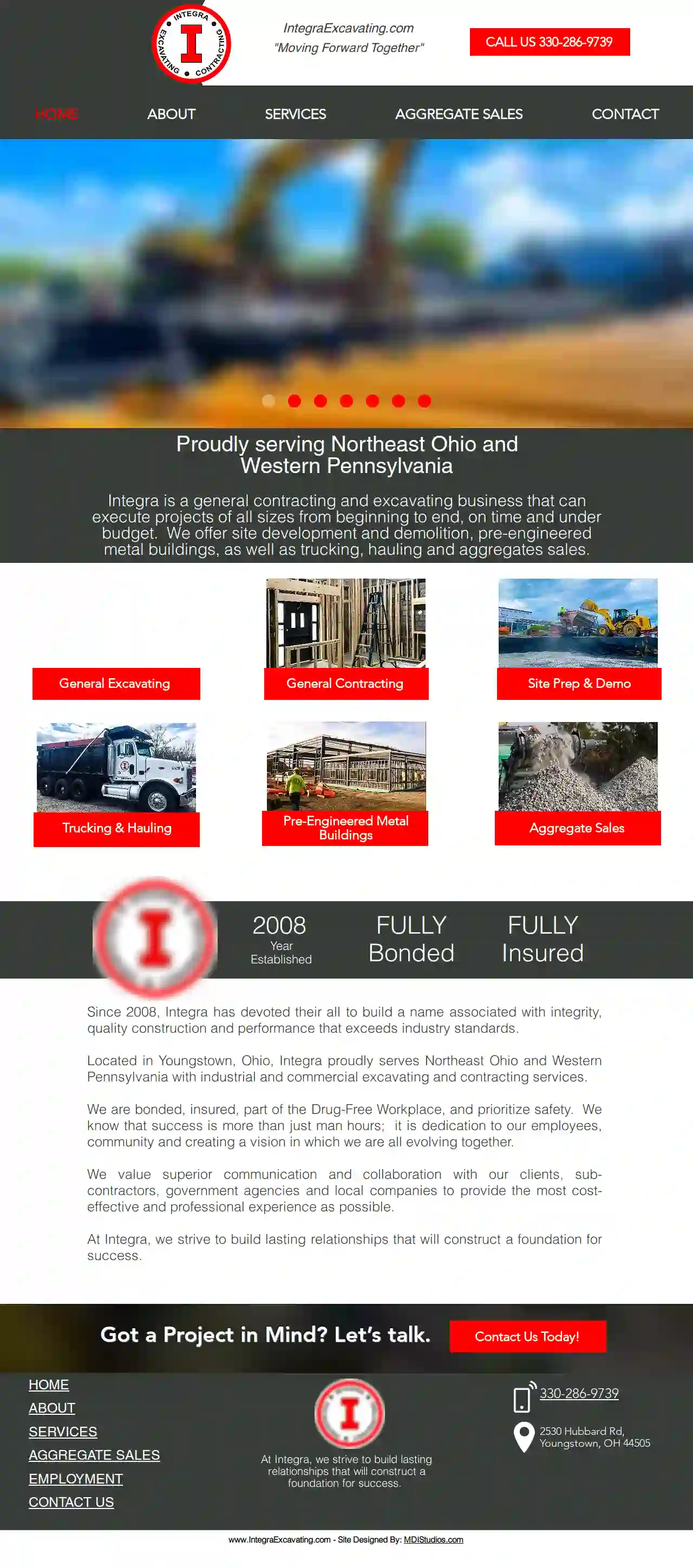
Integra Excavating LLC
4.823 reviews2530 Hubbard Rd, Youngstown, 44505, USIntegra Excavating: Building a Foundation for Success Integra Excavating is a general contracting and excavating business dedicated to delivering high-quality projects of all sizes, on time and within budget. We are committed to exceeding industry standards and building lasting relationships with our clients. Since 2008, we have built a reputation for integrity, quality construction, and exceptional performance. Our team is fully bonded and insured, and we prioritize safety in all our operations. We are proud to serve Northeast Ohio and Western Pennsylvania with a wide range of services, including: General Excavating General Contracting Site Preparation & Demolition Trucking & Hauling Pre-Engineered Metal Buildings Aggregate Sales We believe in open communication and collaboration with our clients, subcontractors, government agencies, and local companies to ensure the most cost-effective and professional experience possible. Our commitment to our employees, community, and shared vision drives our success. Ready to discuss your next project? Contact us today!
- Services
- Why Us?
- Gallery
Get Quote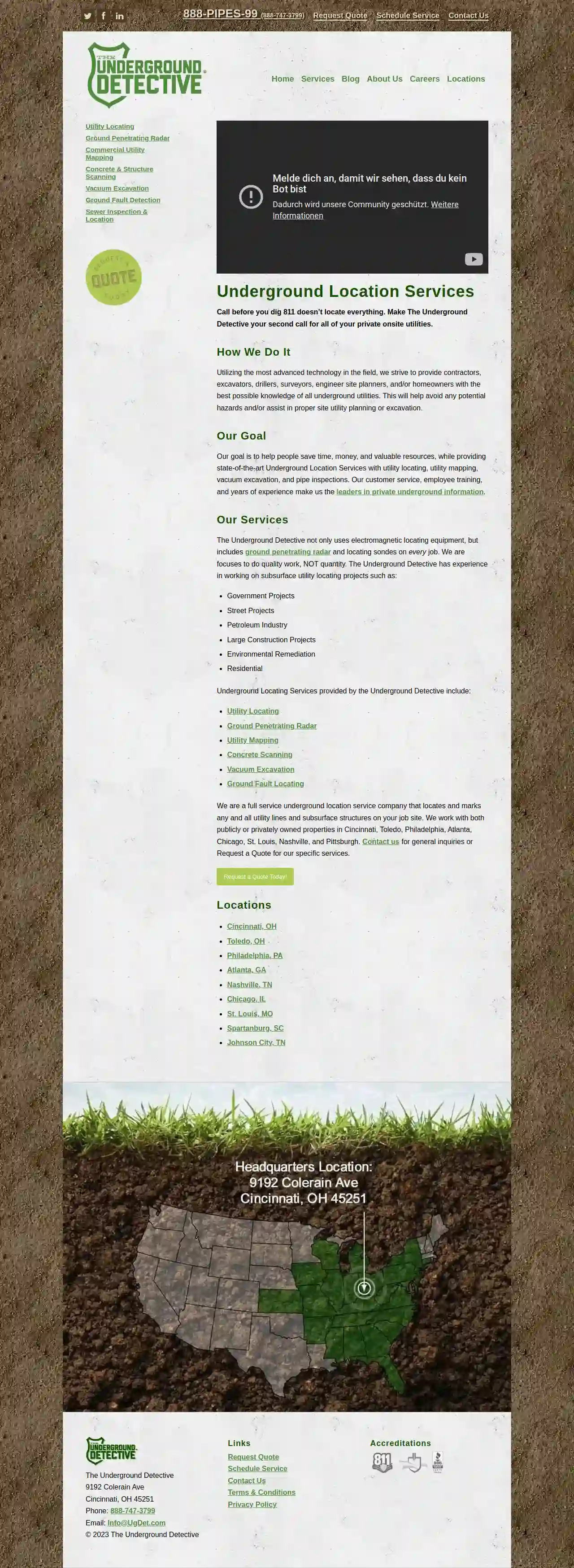
Underground Detective Cincinnati
4.620 reviews9192 Colerain Avenue, Cincinnati, 45251, USCommitted to excellence! The Underground Detective has grown and evolved to provide invaluable services to a wide variety of clients. As years progress and demand continues to change, our commitment to being a family remains strong. We value your time and your trust. We treat our name and your confidence #1 in everything we do and ALWAYS give you all the knowledge we can to save you time, money, and resources. Originally plumbers, the owner of The Underground Detective and his head technician often struggled to find the proper place to excavate when a sewer problem occurred. In 1975, they purchased a piece of equipment to locate underground utilities on their own. Other plumbers in the area began to use their new service, but it wasn’t until 1992 that The Underground Detective of Greater Cincinnati, LLC officially became a company. Since then, the company has grown and expanded to specialize in the location of many underground utilities. Our Mission We strive to provide contractors, excavators, surveyors, engineer site planners, and/or homeowners with the best possible knowledge of all underground utilities. This will help avoid any potential hazards and/or assist in proper site utility planning or excavation. Our goal is to help people save time, money, and valuable resources, while providing state-of-the-art utility locating, utility mapping, vacuum excavation, pipe inspections, and leak locating solutions. Our service and accuracy are unparalleled.
- Services
- Why Us?
- Gallery
Get Quote
Over 22,076+ Excavation Contractors registered
Our excavation contractors operate in Bainbridge & surroundings!
ExcavationHQ has curated and vetted Top Excavation Contractors arround Bainbridge. Find the most trustworthy pro today.
Frequently Asked Questions About Demolition Contractors
- Waste Generation: Demolition generates a large volume of debris, contributing to landfill space and potentially releasing harmful substances into the environment if not disposed of properly.
- Air Pollution: Dust and particulate matter released during demolition can impact air quality, affecting human health and the environment.
- Noise Pollution: Demolition activities can generate significant noise, disturbing nearby residents and wildlife.
- Resource Depletion: Demolition consumes resources that could be salvaged and reused, contributing to resource depletion and environmental degradation.
- 'Can I see proof of your licensing and insurance?' Verify their credentials and coverage.
- 'What experience do you have with projects like mine?' Ensure they have relevant expertise.
- 'Can you provide references from past clients?' Check their reputation and customer satisfaction.
- 'What are your safety protocols?' Prioritize contractors who emphasize safety.
- 'How will you handle hazardous materials?' Ensure they have proper procedures for asbestos or lead abatement.
- 'What is your timeline for completing the project?' Understand the project duration.
- 'How will you manage noise, dust, and debris?' Discuss mitigation measures for minimizing disruption.
- 'What are your payment terms?' Clarify payment schedules and any required deposits.
What are the environmental impacts of demolition?
How long does a demolition project take?
What questions should I ask a demolition contractor before hiring them?
Can I do demolition myself?
What are the environmental impacts of demolition?
- Waste Generation: Demolition generates a large volume of debris, contributing to landfill space and potentially releasing harmful substances into the environment if not disposed of properly.
- Air Pollution: Dust and particulate matter released during demolition can impact air quality, affecting human health and the environment.
- Noise Pollution: Demolition activities can generate significant noise, disturbing nearby residents and wildlife.
- Resource Depletion: Demolition consumes resources that could be salvaged and reused, contributing to resource depletion and environmental degradation.
How long does a demolition project take?
What questions should I ask a demolition contractor before hiring them?
- 'Can I see proof of your licensing and insurance?' Verify their credentials and coverage.
- 'What experience do you have with projects like mine?' Ensure they have relevant expertise.
- 'Can you provide references from past clients?' Check their reputation and customer satisfaction.
- 'What are your safety protocols?' Prioritize contractors who emphasize safety.
- 'How will you handle hazardous materials?' Ensure they have proper procedures for asbestos or lead abatement.
- 'What is your timeline for completing the project?' Understand the project duration.
- 'How will you manage noise, dust, and debris?' Discuss mitigation measures for minimizing disruption.
- 'What are your payment terms?' Clarify payment schedules and any required deposits.